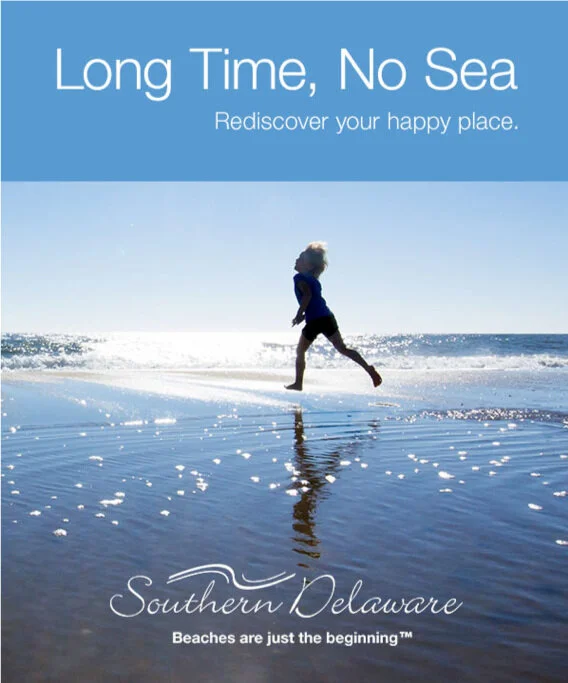COVID-19 Response
Delaware Sea Grant moved quickly to help address negative impacts to education, community resilience and local economies in the state due to the COVID-19 pandemic, implementing a number of responses almost as soon as the lockdown began in the spring and continuing through the fall of 2020. (In addition to the work displayed below, DESG also collected resources for dealing with COVID-19 through remote learning, nature-based recreation and support for specific situations.)
Dan Casey of Delaware Cultured Seafood docks his workboat to unload oysters from his family’s farm.
Commercial Fishing and Aquaculture
Changes within the restaurant industry caused by COVID-19, such as prolonged closures and decreased seating capacity, created a bottleneck between seafood producers and consumers, which significantly affected seafood sales in 2020. To help seafood producers shift sales directly to consumers, Delaware Sea Grant created a webpage (deseagrant.org/seafood) to help promote local, sustainable seafood options and connect the public with seafood providers. DESG also ran advertising campaigns in the summer and fall to promote the webpage and seafood consumption, especially of Inland Bays Oysters.
To further develop a consumer base, DESG implemented a community seafood purchaser network, where DESG collected and relayed consumer demand directly to aquaculturists and commercial fishers and hosted pick-up events, providing supplier exposure and generating over $5,000 in sales over six events. Additionally, DESG purchased 75,000 farmed oysters from aquaculturists for use in an ongoing restoration effort in Rehoboth Bay and for further growth in Delaware Bay waters where commercial harvesters produce the state’s wild harvest oysters. This will provide economic benefits to the aquaculturists and commercial fishers, as well as ecological benefits to Rehoboth and Delaware Bays.
Delaware Tourism Industry
Tourism is one of the two pillars of coastal Delaware’s economy, along with agriculture, and typically generates $2.1 billion annually in visitor spending while supporting 19,000 jobs. However, COVID-19 had a significant impact on this sector.
To support the struggling industry, Delaware Sea Grant supported a regional marketing campaign by the Southern Delaware Tourism Office to promote safe, timely travel back to coastal Delaware in a responsible manner. The digital campaign focused on visitors within a 2 ½-hour drive of southern Delaware and directly resulted in 1.5 million impressions, more than 360,000 unique views, and more than 200 hotel bookings. Economic impacts are currently being tracked.
The rendering above shows a possible outcome of the Laurel Redevelopment Corporation’s Community Economic Resilience grant to help attract a paddling outfitter to the banks of the Broad Creek.
Community Economic Resilience
The COVID-19 pandemic’s effect on the economies of Delaware’s coastal communities also prompted DESG to consider what could be done to encourage the diversification of local economies to increase both economic and ecological resilience. DESG solicited proposals from Delaware communities for projects that would enhance local economies, create businesses and jobs, enhance quality of life and community livability, increase sustainability, and improve the quality of our coastal environments. Four projects were selected for funding:
Frederica — With help from the University of Delaware’s Coastal Resilience Design Studio, this Kent County town will add a farmer’s market to provide food within town limits and support the local agricultural community.
Northeast Wilmington — This project will involve branding, signage and other beautification efforts for gateway streets, along with engagement for teens and others in green infrastructure opportunities in the neighborhood.
Slaughter Beach — This Bayshore community will plan, design and build an oyster remote set operation to its commercial waterfront, supporting maritime jobs in the community and strengthening the oyster aquaculture industry in Delaware. The operation will allow oysters to grow through their earliest stages in tanks before being transferred to state waters, providing protection from predators and higher success rates for oyster farming.
Cape Community Coordination for COVID-19
Nearly one-third of Sussex County, Delaware residents experience three or more of 12 CDC social vulnerability risk factors. These vulnerabilities are exacerbated by the COVID-19 pandemic. Response efforts revealed critical capacity shortages at the county and local levels, leading a group of volunteers to form the Cape Community Coordination for COVID-19 (CCC4COVID)—the only grassroots COVID-19 response coalition of its size and scope in Delaware. Delaware Sea Grant joined CCC4COVID to lend capacity to local response efforts. DESG identified and improved significant communication gaps between state, county and local response efforts.
DESG also formed a workgroup focused on the needs of older adults; led a survey of coalition partners to document the strengths and impacts of CCC4COVID; and helped collect and distribute personal hygiene and household sanitation items to lower income families. Learn more in our News section.
Remote teaching meant science labs conducted in DESG staff members’ kitchens.
Remote Learning
Since 2012, Delaware Sea Grant has conducted an in-person Oceanography Merit Badge program for the Boy Scouts of America. In response to the COVID-19 pandemic, DESG created a new, virtual merit badge class consisting of live Zoom sessions on four consecutive Saturdays, plus asynchronous videos for scouts to watch between live sessions. Two cohorts of scouts from 11 states have participated in the online merit badge class for a total of 25 students. Additional cohorts are being scheduled, and once COVID-19 restrictions are lifted, the program will be offered both in-person and virtually.
In addition to this effort, in April DESG also collated a broad range of materials aimed at providing teachers, parents, and students support for at-home learning ideas, such virtual field trips, classroom activities, videos, and publications. Learn more in our News section.





